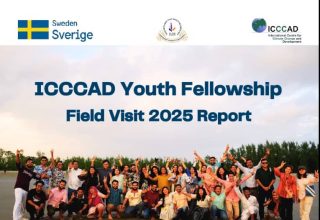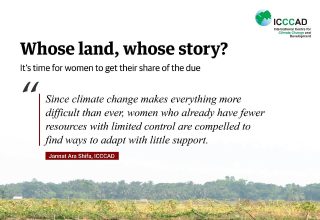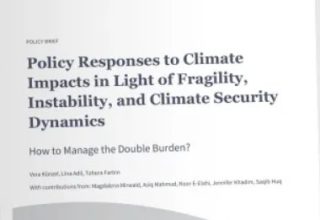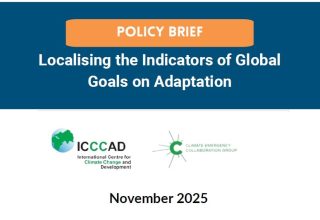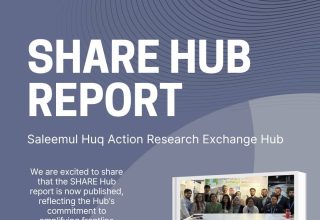
As part of an ongoing action research initiative, our team has been co-facilitating the selection of “Change Agents” in multiple Water Management Groups (WMGs) in southern Bangladesh. These sessions form a crucial part of our work in developing locally led, socially inclusive agricultural business models that respond to climate change challenges. At the heart of the initiative is an iterative, participatory process designed to empower marginalized voices and build adaptive capacities from the ground up.
Yet, what we encountered during these sessions surfaced a deeper question: What does locally led adaptation really look like when existing power structures, gender norms, and political tensions shape the process?

The selection of the “Change Agents” was carried out through a two-step, participatory process involving two meetings with each Water Management Group (WMG). In the first meeting, the concept of a leadership scoring system was explained to all the members in simple, accessible terms. The members were asked to assess each potential candidate based on a specific leadership quality – knowledge and access to information, communication and collaboration skills, accountability and resource management, etc. – using a basic scoring method.
The individual scores were then compiled and the results were shared in a follow up meeting with the WMGs. During this session, members were given the opportunity to reflect on the outcomes and confirm or revise their selections. This step validated the results, ensuring transparency and accountability in the process.

In more than one community, nomination processes were disrupted—or heavily influenced—by local power brokers. At one session, external political interference halted activities altogether, demanding committee reformation based on party affiliations. In other instances, executive members exerted pressure to favor their preferred nominees, sidelining our criteria for inclusive and merit-based selection.
These experiences reveal the uncomfortable truth that “local leadership” is not inherently democratic or inclusive. Without safeguards and facilitation, participatory processes risk becoming performative—replicating existing hierarchies instead of challenging them.
Gender bias remained one of the most persistent obstacles. While a few sessions showcased positive female leadership, most failed to uphold gender balance in nominations. In some cases, female nominees were rejected outright. Even where women were present, scoring systems skewed against them—reinforcing societal expectations that limit their leadership in water governance or social farming.
This contradiction lies at the heart of locally led adaptation: how can women lead when spaces are neither safe nor equitable? Our work shows the importance of both pushing for inclusion and creating enabling environments—not just quotas or checklists.
We introduced a scoring system to help participants evaluate candidates transparently. But time and again, we saw that personal relationships trumped process. “Known” individuals were favored, while newcomers with potential were sidelined. Participants either rushed through scoring or ignored it altogether There was a tendency among certain Executive Committee members to align their decisions based on group preferences or internal affiliations, which may have influenced the selection process. Still, this resistance isn’t simply about unwillingness—it reflects the social fabric in which trust is built through kinship, reputation, and community embeddedness. Our models must account for this tension if they are to be both inclusive and credible.
Despite these challenges, many participants were genuinely interested in innovation. From zero-tillage potato cultivation to short-duration Aman varieties, there was curiosity about how adaptive trials could enhance livelihoods. But implementing these ideas was often constrained by land insecurity, short-term leasing, or a lack of budgeting familiarity. Land leasing takes place year-round and follows a specific season-based system. To successfully implement adaptive trials and the social farming models, we need to align with this system and follow its established procedures for land acquisition. These barriers highlight why agricultural innovation must be embedded in broader social business models that address tenure, risk-sharing, and collective planning. Innovation without enabling systems is unlikely to scale.
Field conditions were often far from ideal—ranging from stormy weather to market-day clashes. In some cases, half the agenda remained unfinished. But as a team, we embraced this as part of the iterative learning cycle. We listened, adapted facilitation styles, reviewed scoring frameworks, and continuously refined our tools in response to community realities.
Our work is not about implementing a fixed blueprint. It is about walking alongside communities, co-creating processes that are flexible, responsive, and grounded in their lived experience.
Locally led adaptation is a powerful idea—but it must be constantly interrogated and re-shaped in practice. For participation to be transformative, it cannot simply mirror the local it must challenge the unequal, the exclusive, and the extractive.

Our experiences from the field affirm this truth: participation is a practice, not a promise. And inclusive adaptation is only possible when that practice is political, reflective, and just.
This commitment to genuine participation was clearly reflected in the attitudes of the community members. Notably, several women participants expressed their willingness to take responsibility in practicing new technologies. In some WMGs, change agents were selected entirely from outside the Executive Committee, demonstrating strong enthusiasm and commitment to actively contribute to the WMG’s activities
About the Authors:
Md. Lutfor Rahman (Senior Research Officer), International Centre for Climate Change and Development (ICCCAD)
Farhin Rahman Reeda (Research Officer), International Centre for Climate Change and Development (ICCCAD)
Dipok Kumar Chowdhury (Research Associate -Agricultural Economics),International Maize and Wheat Improvement Center (CIMMYT)
Acknowledgment:
This blog reflects learnings from the PARIBARTAN project team, and the dedicated efforts of our field facilitators and community partners who continue to shape a more inclusive and resilient future. The PARIBARTAN project is led by International Maize and Wheat Improvement Center (CIMMYT), International Centre for Climate Change and Development (ICCCAD) and Shushilan NGO. The project is funded by the Australian Centre for International Agricultural Research (ACIAR).







